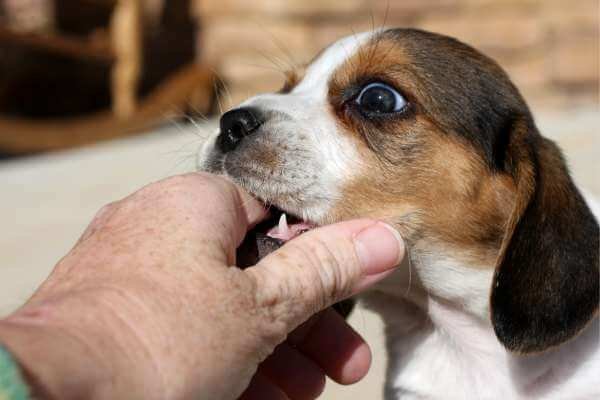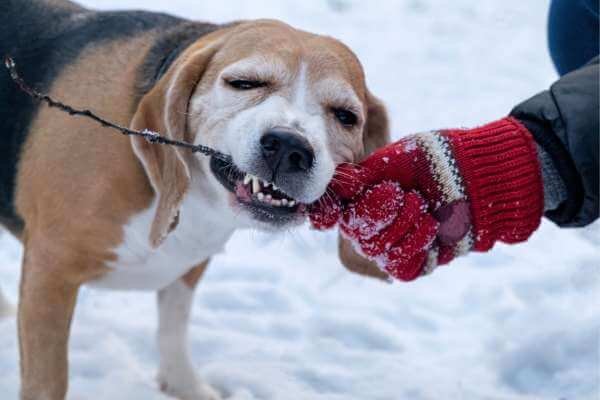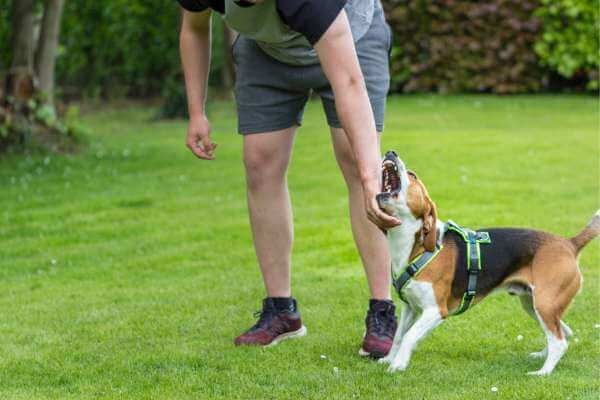Beagles, with their playful nature and affectionate demeanor, are cherished companions for many families. However, some Beagle owners may encounter a common behavior challenge – excessive biting. In this article, we delve into the reasons why do Beagles bite so much and explore effective strategies to manage and redirect this behavior.
5 Reasons Why Do Beagles Bite So Much

- Teething and Exploration: Like all puppies, Beagles go through a teething phase during which they may chew and bite to alleviate discomfort. Additionally, Beagles are naturally curious and use their mouths to explore their environment. Understanding that biting is often an instinctual part of their teething process and exploration can help manage expectations.
- Playful Behavior: Beagles are playful and energetic dogs. Biting can be a form of play for them, especially when interacting with family members or other pets. Teaching appropriate play behaviors and providing alternative outlets for their energy can redirect this behavior.
- Communication and Attention-Seeking: Beagles are social animals and may use biting as a form of communication or to seek attention. If they feel lonely or want interaction, they may resort to gentle nipping. Encouraging positive interactions and spending quality time with your Beagle can address attention-seeking behaviors.
- Herding Instincts: Beagles have a history of hunting and tracking dogs with herding instincts. In some cases, biting may be an expression of their herding nature. This behavior can be redirected through training and providing appropriate outlets for their energy.
- Fear or Anxiety: Biting can also be a response to fear or anxiety. Beagles may resort to biting as a way to communicate discomfort or unease. Identifying and addressing the root cause of their anxiety, whether related to new environments, unfamiliar people, or loud noises, is crucial for behavioral modification.
Effective Strategies to Manage Beagle Biting:

- Early Training: Start training your Beagle from an early age to establish clear boundaries and expectations. Positive reinforcement techniques, such as rewarding good behavior, can be effective in discouraging biting.
- Provide Chew Toys: Offer a variety of chew toys to satisfy their teething needs. Redirecting their biting behavior towards appropriate items can prevent damage to furniture or belongings.
- Regular Exercise: Beagles are an active breed that requires regular exercise to expend their energy. Ensure they receive sufficient physical and mental stimulation through walks, playtime, and engaging activities.
- Socialization: Expose your Beagle to various environments, people, and other pets to promote positive socialization. This can reduce anxiety and help minimize biting behaviors triggered by fear or unfamiliarity.
- Consistent Reinforcement: Be consistent in reinforcing good behavior and discouraging biting. Avoid encouraging rough play that may escalate into biting and provide gentle corrections when necessary.
Chew toys bestsellers
Why does my beagle randomly bite me?
When Beagles resort to biting as a form of self-defense, there are typically accompanying indicators like mistrust, anxiety, pain, and fear. Dogs usually bite in self-defense only after providing warnings, but these signs are often overlooked by most individuals.
Are Beagles naturally aggressive?
Beagles are recognized for their hunting instincts, and they may pursue squirrels, cats, or other small creatures. Although they typically display non-aggressive behavior towards other dogs, they might engage in confrontations if they perceive a challenge to their dominance.
At what age does a beagle calm down?
Beagles typically start to calm down around 4-5 years old, with noticeable changes in energy levels and obedience skills occurring between 12-18 months and 2.5-3 years old
Do dogs remember if they bite someone?
Dogs generally have a memory of events, including interactions and experiences. However, the extent to which a dog remembers an incident, such as biting someone, can vary. Dogs have a shorter-term memory compared to humans, and their recollection is often influenced by the significance and emotional impact of the event.
If a dog has bitten someone, it is more likely to remember the associated circumstances and emotions rather than the specific act itself. Factors such as the dog’s temperament, the context of the bite, and the actions taken afterward can influence how the dog perceives and remembers the event.
It’s important to note that a dog’s memory is not equivalent to human memory, and their behaviors are also shaped by immediate stimuli and ongoing training. Professional intervention, positive reinforcement training, and addressing the root causes of the biting incident are crucial for preventing future occurrences and ensuring a positive relationship between the dog and its human companions.
Conclusion of Why Do Beagles Bite So Much

Understanding the underlying reasons for Why Do Beagles Bite So Much Behavior is essential for effective training and fostering a harmonious relationship. With patience, consistent training, and positive reinforcement, Beagle owners can guide their furry friends toward appropriate behaviors, ensuring a happy and well-behaved canine companion.









